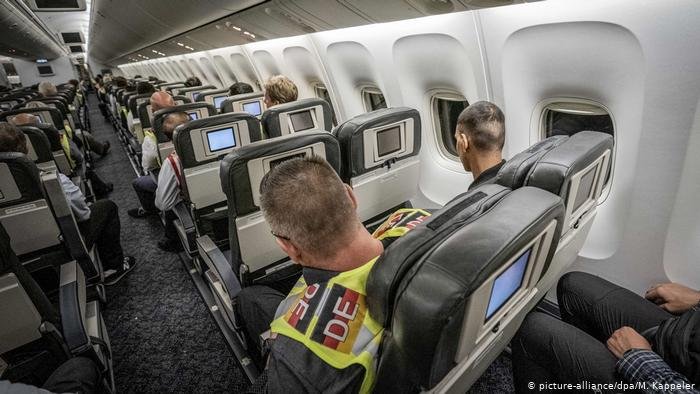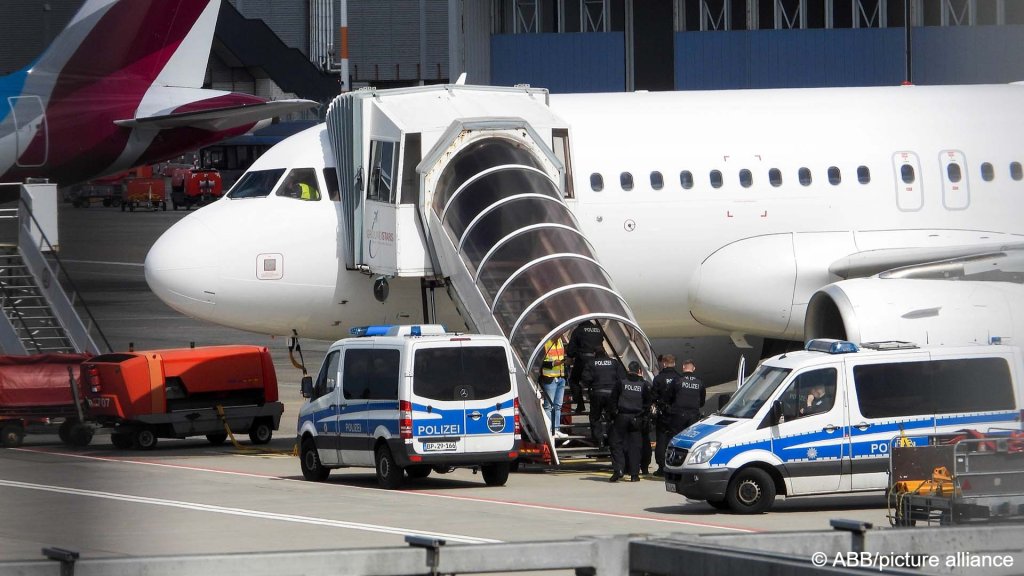After an Afghan national drove his car into a crowd in Munich on Thursday, some politicians reiterated demands to deport convicted criminals, while others warned of divisive reactions. The timing for deportations from Germany to Afghanistan, meanwhile, is still unclear.
The Afghan national accused of injuring 36 people on Thursday (February 13) in the southern German city of Munich on Friday admitted to driving his car into the crowd on purpose, news agency Reuters reported Friday afternoon citing a prosecutor.
Moreover, authorities have determined an Islamist motive for the crime, the prosecutor said.
"He has admitted that he deliberately drove into the participants of the demonstration," lead prosecutor Gabriele Tilmann told journalists, adding that the suspect had spoken German in a two-hour interrogation.
"I'm very cautious about making hasty judgments, but based on everything we know at the moment, I would venture to speak of an Islamist motivation for the crime," she said.
At least 36 people including a toddler were hurt on Thursday when the 24-year-old man, who is under investigation on 36 counts of attempted murder, ploughed into demonstrators gathered in Munich’s city center.
Officers reportedly fired on his car after the attack without hitting the suspect, Reuters reported. According to Tilmann, he then said the words "Allahu akbar" ("God is greatest") and prayed in the presence of police.
The attack occurred hours before foreign leaders including US Vice President JD Vance and Ukrainian President Volodymyr Zelenskiy arrived in the city for the Munich Security Conference. Yet police said there was no link between the two events.
Afghan had residency title and work permission
According to the prosecutor, there was no evidence to suggest that the suspect, identified as asylum seeker Farhad N., had ties to any Islamist or terrorist organizations, Reuters reported.
Tilman reportedly said there were no signs of accomplices, but that investigators were evaluating his communications -- mostly in Dari, a language spoken in Afghanistan -- and items obtained during searches to determine whether anyone had prior knowledge of the crime or was involved.
Contrary to initial police information and subsequent media reports, the alleged perpetrator had not committed shoplifting offenses. Instead, the man reportedly worked as a store detective and was a witness in several trials.
According to German news agency dpa citing Bavaria's interior minister Herrmann, the Afghan also had a valid residence permit and a work permit.
"Based on the current state of knowledge, the perpetrator's stay was absolutely lawful up to the present day," Herrmann told dpa Thursday evening.
According to Herrmann, the Afghan came to Germany at the end of 2016 as an unaccompanied minor refugee. His asylum procedure was rejected in 2020, and he was ordered to leave the country. However, in April 2021, authorities in Munich then issued a temporary suspension of deportation and a residence permit six months later.
The young man had attended school and completed vocational training, Herrmann said further. "He then worked as a store detective for two security companies," the minister pointed out. According to dpa, Herrmann also said that no decision had yet been made on extending the residence permit, which means it remained valid until a decision was made.
In a TV interview Thursday evening, Bavaria's Prime Minister Markus Söder confirmed the suspect was not obliged to leave the country. "The perpetrator himself had probably been inconspicuous until now," Söder said. "So there are no corresponding indications."
Deportations to Afghanistan before elections unlikely
The attack in Munich has put security and deportations back in focus before next weekend's federal election. Three other violent attacks committed by foreigners over the past nine months had previously re-ignited the debate on migration and deportations.
In May, an Afghan national fatally stabbed a police officer in the city of Mannheim; in September, a Syrian killed three people and injured eight more in Solingen; and last month, a child and a passer-by died after being attacked by an Afghan with a knife in the city of Aschaffenburg.
The tragedies caused widespread shock and calls by politicians of different stripes to tighten migration and asylum laws, including faster deportations. The heated debate culminated in last month's failed attempt by the conservative CDU/CSU candidate for Chancellor, Friedrich Merz, to push through a controversial motion for a stricter migration policy with votes from the far-right AfD party.
Last August, 28 Afghan nationals, all of whom were convicted offenders, were deported from Germany for the first time since the radical Islamic Taliban returned to power in 2021. In September, Interior Minister Faeser announced that there will be further returns of migrants who have committed serious crimes in Germany to Afghanistan.
Still, the timing for deportations from Germany to Afghanistan remains unclear.

Taliban says it's open to cooperation
On Friday (February 14), government spokesman Steffen Hebestreit said he could "not raise excessive hopes" that there would be such a flight by the snap federal election, which will take place on February 23. Hebestreit however said the government was continuing to work "intensively" on the preparations.
According to news agency AFP, Hebestreit pointed out that Germany has no diplomatic representation in Afghanistan. "Due to the particular situation, this is not that easy," he emphasized.
He also noted that Germany is in talks with international partners. However, he could "not say exactly how quickly this will happen."
A spokesperson for the Federal Ministry of the Interior meanwhile said that a number of factors play a role in making such flights possible, "including flight permits, landing permits, and cooperation with third countries".
Dates for such deportations could not be given in advance either, in order "not to warn people and not to endanger such measures".
The Taliban regime in Afghanistan, meanwhile, says it was open to cooperating on deportations in the wake of the alleged attack in Munich, dpa reported on Thursday. In return, however, the Islamists want a consular mission in Germany. “We have shown our willingness to resume consular services for Afghans in Germany that cover all aspects of migration," a Taliban spokesman told dpa.
Read AlsoGermany: Debate on deportation heats up following deadly knife attack
Afghans top the list for Dublin transfers
According to dpa, Germany's 16 federal states deported just over 20,000 people last year, 22 percent more than in 2023.
Roughly one in four of deportees were so-called Dublin transfers, which means they were returned to the EU country where they first sought protection and which is responsible for their asylum procedure.
Citing an answer from the government to a request from The Left faction, dpa reported that most of these transfers went to Austria, France and Spain.
Moreover, Afghans were the largest group: According to the government, 1,232 Afghan citizens were transferred under Dublin rules last year. The Dublin System involves EU member states as well as Switzerland, Norway, Liechtenstein and Iceland.
Upon request by InfoMigrants, Bavaria's State Office for Asylum and Returns (LFAR) said it returned 278 Afghan nationals, 229 of them Dublin cases. The top three return countries were France, Austria and Latvia; three Afghans were among the aforementioned group of convicted criminals who were returned to Afghanistan in August.
When asked whether the other 275 Afghans who were deported to countries other than Afghanistan were convicted offenders, LFAR said "the requested data is not statistically recorded and cannot be collected with reasonable effort."
Among all deportations, Georgia and North Macedonia -- followed by Turkey, Albania and Serbia -- were reportedly the most common destination countries.
After the fall of the Assad regime in December, a similar debate around deporting Syrians from Germany: Among other things, Interior Minister Faeser proposed fast-tracking deportation of individuals found to be involved in criminal activities and/or Islamist extremism.
Read Also
Germany raises concerns over deportations of Afghan refugees from Pakistan

Politicians' reactions
In light of the alleged attack in Munich, German Chancellor Olaf Scholz on Thursday (February 13) spoke out very clearly in favor of the systematic deportation of criminals from Germany.
"Anyone here who does not have German citizenship and commits crimes of this kind must also expect us to take them out of this country, take them away and deport them," Scholz said on a show of public broadcaster ZDF.
Scholz assured that this would also happen to the suspect in Munich. "We will certainly see him convicted by the courts, and even before he leaves prison, he will then also be returned to his home country," he said.
Foreign Minister Annalena Baerbock, meanwhile, warned against a rift in Germany's democratic society. In view of the challenges at home and abroad, it is all the more important "that we stand together as democrats in our country as well," the Green Party politician reportedly said on the sidelines of a visit to the French capital.
"[Let's] not allow ourselves to be divided, neither by right-wing extremists nor by Islamists who challenge our constitutional state from within," she added.
Also reacting to the Munich attack, Friedrich Merz, the conservative CDU/CSU's candidate for chancellor, said on X that the safety of the people in Germany will be our top priority. "We will rigorously enforce law and order. Everyone must feel safe again in our country. Something has to change in Germany."
Left politician Clara Bünger, on the other hand, vehemently criticized the migration debate of the election campaign, saying it was "dominated by hostile images and agitation."
"The case of Munich shows it: within hours, lies about the perpetrator ("drug-dependent, known to the police, required to leave the country") were circulating," she wrote, referring to the false information police in Munich had initially put out. She also warned of a growing number of attacks on refugee accommodation and that people seeking protection are being targeted.
with dpa, AFP, Reuters
